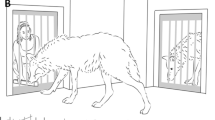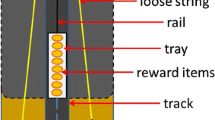Abstract
Despite many observations of cooperation in nature, laboratory studies often fail to find careful coordination between individuals who are solving a cooperative task. Further, individuals tested are often naïve to cooperative tasks and there has been little exploration of partnerships with mixed expertise. In the current study, we examined acquisition of a cooperative pulling task in a group with both expert (N = 4) and novice (N = 11) chimpanzees (Pan troglodytes). We used five measures of competence and understanding: (1) success at the task, (2) latency to succeed, (3) efficiency, (4) uncoordinated pulling, and (5) pulling when a partner was present versus absent. We found that novices showed evidence of trial and error learning and developed competence over time, whereas the behavior of experts did not change throughout the course of the study. In addition to looking at patterns over time, we compared the performance of novices in this mixed-expertise group to an earlier study of novices in a group of all-novices. Novices in the mixed-expertise group pulled the same overall amount but for shorter periods of time, leading to higher pulling rates than individuals in the all-novice group. Taken together, these results suggest that learning in the presence of experts led to rapid and frequent success, although not necessarily careful coordination.







Similar content being viewed by others
References
Albers PCH, de Vries H (2001) Elo-rating as a tool in the sequential estimation of dominance strengths. Anim Behav 61:489–495. https://doi.org/10.1006/anbe.2000.1571
Alem S, Perry CJ, Zhu X, Loukola OJ, Ingraham T, Søvik E, Chittka L (2016) Associative mechanisms allow for social learning and cultural transmission of string pulling in an insect. PLoS Biol 14:e1002564. https://doi.org/10.1371/journal.pbio.1002564
Bailey I, Myatt JP, Wilson AM (2013) Group hunting within the Carnivora: physiological, cognitive and environmental influences on strategy and cooperation. Behav Ecol Sociobiol 67:1–17. https://doi.org/10.1007/s00265-012-1423-3
Bates D, Maechler M, Bolker B, Walker S (2015) Fitting linear mixed-effects models using lme4. J Stat Softw 67:1–48. https://arxiv.org/abs/1406.5823
Boesch C (2002) Cooperative hunting roles among Tai chimpanzees. Hum Nat 13:27–46. https://doi.org/10.1007/s12110-002-1013-6
Borrego N, Dowling B (2016) Lions (Panthera leo) solve, learn, and remember a novel resource acquisition problem. Anim Cogn 19:1019–1025. https://doi.org/10.1007/s10071-016-1009-y
Bouchard J, Goodyer W, Lefebvre L (2007) Social learning and innovation are positively correlated in pigeons (Columba livia). Anim Cogn 10:259–266. https://doi.org/10.1007/s10071-006-0064-1
Brooks ME, Kristensen K, van Benthem KJ, Magnusson A, Berg CW, Nielsen A, Skaug HJ, Maechler M, Bolker BM (2017) Modeling zero-inflated count data with glmmTMB. bioRxiv: 132753. https://doi.org/10.1101/132753
Chalmeau R, Gallo A (1995) Cooperation in primates: critical analysis of behavioural criteria. Behav Process 35:101–111. https://doi.org/10.1016/0376-6357(95)00049-6
Chalmeau R, Visalberghi E, Gallo A (1997) Capuchin monkeys, Cebus apella fail to understand a cooperative task. Anim Behav 54:1215–1225. https://doi.org/10.1006/anbe.1997.0517
Crawford MP (1937) The cooperative solving of problems by young chimpanzees. Comp Psychol Monogr 14:1–88
Cronin KA, Kurian AV, Snowdon CT (2005) Cooperative problem solving in a cooperatively breeding primate (Saguinus oedipus). Anim Behav 69:133–142. https://doi.org/10.1016/j.anbehav.2004.02.024
De Waal FBM, Suchak M (2010) Prosocial primates: selfish and unselfish motivations. Philos Trans R Soc B 365:2711–2722. https://doi.org/10.1098/rstb.2010.0119
Drea CM, Carter AN (2009) Cooperative problem solving in a social carnivore. Anim Behav 78:967–977. https://doi.org/10.1016/j.anbehav.2009.06.030
Dugatkin LS (1997) Cooperation among animals: an evolutionary perspective. Oxford University Press, New York
Ericcson KA, Krampe RT, Tesch-Römer C (1993) The role of deliberate practice in the acquisition of expert performance. Psychol Rev 100:363–406. https://doi.org/10.1037/0033-295X.100.3.363
Fletcher GE, Warneken F, Tomasello M (2012) Differences in cognitive processes underlying the collaborative activities of children and chimpanzees. Cogn Dev 27:136–153. https://doi.org/10.1016/j.cogdev.2012.02.003
Hirata S, Fuwa K (2007) Chimpanzees (Pan troglodytes) learn to act with other individuals in a cooperative task. Primates 48:13–21. https://doi.org/10.1007/s10329-006-0022-1
Hirata S, Morimura N, Fuwa K (2010) Intentional communication and comprehension of the partner’s role in experimental cooperative tasks. In: Lonsdorf EV, Ross SR, Matsuzawa T (eds) The mind of the chimpanzee: ecological and experimental perspectives. University of Chicago Press, Chicago, pp 251–264
Jelbert SA, Singh PJ, Gray RD, Taylor AH (2015) New Caledonian Crows rapidly solve a collaborative problem without cooperative cognition. PLoS ONE 10:e0133253. https://doi.org/10.1371/journal.pone.0133253
Laland KN (2004) Social learning strategies. Learn Behav 32:4–14
Melis AP, Tomasello M (2013) Chimpanzees’ strategic helping in a collaborative task. Biol Lett 9:20130009. https://doi.org/10.1098/rsbl.2013.0009
Melis AP, Hare B, Tomasello M (2006a) Chimpanzees recruit the best collaborators. Science 311:1297–1300. https://doi.org/10.1126/science.1123007
Melis AP, Hare B, Tomasello M (2006b) Engineering cooperation in chimpanzees: tolerance constraints on cooperation. Anim Behav 72:275–286. https://doi.org/10.1016/j.anbehav.2005.09.018
Melis AP, Hare B, Tomasello M (2009) Chimpanzees coordinate in a negotiation game. Evol Hum Behav 30:381–392. https://doi.org/10.1016/j.evolhumbehav.2009.05.003
Mendres KA, De Waal FBM (2000) Capuchins do cooperate: the advantage of an intuitive task. Anim Behav 60:523–529. https://doi.org/10.1006/anbe.2000.1512
Neumann C, Duboscq J, Dubuc C, Ginting A, Irwan AM (2011) Assessing dominance hierarchies: validation and advantages of progressive evaluation with Elo-rating. Anim Behav 82:911–921. https://doi.org/10.1016/j.anbehav.2011.07.016
Ostojiu L, Clayton NS (2014) Behavioural coordination of dogs in a cooperative problem-solving task with a conspecific and a human partner. Anim Cogn 17:445–459. https://doi.org/10.1007/s10071-013-0676-1
Péron F, Rat-Fischer L, Lalot M, Nagle L, Bovet D (2011) Cooperative problem solving in African grey parrots (Psittacus erithacus). Anim Cogn 14:545–553. https://doi.org/10.1007/s10071-011-0389-2
Plotnik JM, Lair R, Suphachoksahakun W, De Waal FBM (2011) Elephants know when they need a helping trunk in a cooperative task. Proc Natl Acad Sci 108:5116–5121. https://doi.org/10.1073/pnas.1101765108
Povinelli DJ, O’Neill DK (2000) Do chimpanzees use their gestures to instruct each other? In: Baron-Cohen S, Tager-Flusberg H, Cohen DJ (eds) Understanding other minds. Perspectives from developmental cognitive neuroscience. Oxford University Press, Oxford, pp 459–487
Price EE, Lambeth SP, Schapiro SJ, Whiten A (2009) A potent effect of observational learning on chimpanzee tool construction. Proc R Soc Lond B Biol Sci 276:3377–3383. https://doi.org/10.1098/rspb.2009.0640
R Core Team (2017) R: a language and environment for statistical computing. R Foundation for Statistical Computing, Vienna. http://www.R-project.org/
Seed AM, Clayton NS, Emery NJ (2008) Cooperative problem solving in rooks (Corvus frugilegus). Proc R Soc Lond B Biol Sci 275:1421–1429. https://doi.org/10.1098/rspb.2008.0111
Suchak M, Eppley TM, Campbell MW, De Waal FBM (2014) Ape duos and trios: spontaneous cooperation with free partner choice in chimpanzees. PeerJ 2:e417. https://doi.org/10.7717/peerj.417
Suchak M, Eppley TM, Campbell MW, Feldman RA, Quarles LF, de Waal FBM (2016) How chimpanzees cooperate in a competitive world. Proc Natl Acad Sci USA 113:10215–10220. https://doi.org/10.1073/pnas.1611826113
Visalberghi E, Quarantotti BP, Tranchida F (2000) Solving a cooperation task without taking into account the partner’s behavior: the case of capuchin monkeys (Cebus apella). J Comp Psychol 114:297–301. http://dx.doi.org.ezproxy.canisius.edu/10.1037/0735-7036.114.3.297
Warneken F, Chen F, Tomasello M (2006) Cooperative activities in young children and chimpanzees. Child Dev 77:640–663. https://doi.org/10.1111/j.1467-8624.2006.00895.x
Whiten A, Horner V, De Waal FBM (2005) Conformity to cultural norms of tool use in chimpanzees. Nature 437:737–740. https://doi.org/10.1038/nature04047
Acknowledgements
We thank the Veterinary and Animal Care staffs at the Yerkes National Primate Research Center (YNPRC) for maintaining the health of our research subjects.
Funding
This study was supported by the Emory Dean’s Teaching Fellowship program; the Expanding the Science and Practice of Gratitude Project run by the Greater Good Science Center in partnership with University of California, Berkeley with funding from the John Templeton Foundation; the Canisius Earning Excellence Program; and National Institutes of Health’s Office of Research Infrastructure Programs base grant to the Yerkes National Primate Research Center, P51OD011132.
Author information
Authors and Affiliations
Corresponding author
Ethics declarations
Conflict of interest
Malini Suchak, Julia Watzek, Luke F. Quarles, and Frans B.M. de Waal declare that they have no conflict of interest.
Ethical standard
All applicable international, national, and institutional guidelines for the care and use of animals were followed. All procedures were approved by Emory University’s Institutional Animal Care and Use Committee (IACUC), protocol #YER-2000180-53114GA prior to commencement of the study. The YNPRC is furthermore fully accredited by the Association for Assessment and Accreditation of Laboratory Animal Care (AAALAC).
Electronic supplementary material
Below is the link to the electronic supplementary material.
Rights and permissions
About this article
Cite this article
Suchak, M., Watzek, J., Quarles, L.F. et al. Novice chimpanzees cooperate successfully in the presence of experts, but may have limited understanding of the task. Anim Cogn 21, 87–98 (2018). https://doi.org/10.1007/s10071-017-1142-2
Received:
Accepted:
Published:
Issue Date:
DOI: https://doi.org/10.1007/s10071-017-1142-2




